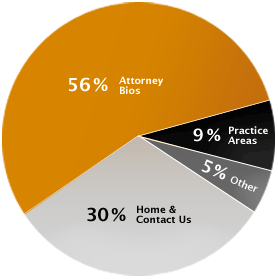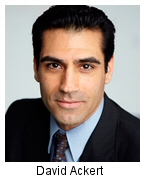As Seen on TV--Growing Your Business Law Practice!
 Sara Derakhshanian, a Lexis-Nexis law marketing specialist, explains how the television show "Shark Tank" can help attorneys whose practices focus on patents, trademarks, etc.
Sara Derakhshanian, a Lexis-Nexis law marketing specialist, explains how the television show "Shark Tank" can help attorneys whose practices focus on patents, trademarks, etc.
Nearly 5 million people tuned in to watch "Shark Tank" last season, where entrepreneurs pitch their ideas to potential investors. Television commercials frequently appear, reminding inventors that they can file patents and (maybe) make a lot of money, just like that guy who came up with that idea for that thing that a big company bought.
This type of publicity offers fresh opportunities for attorneys whose legal practices don't usually scream "television" or "high-profile." However, attorneys who focus on patents, business formations, LLCs, copyrights, trademarks, intellectual property and other fairly technical areas have a terrific opportunity to jump on these trends and grow their client base.
For example, Glenn Peterson, an attorney who specializes in trademark cases, comments online about intellectual property controversies, such as an infringement case regarding the “I-heart-NY” logo has caught the attention of the legal world. When not representing clients, Peterson writes industry articles and provides media commentary—and is frequently featured in print, on line and on the air. When not representing clients, Peterson writes industry articles and provides media commentary—and is frequently featured in print, on line and on the air.
In order to capitalize on this new awareness, attorneys should tackle a two-prong approach. One is business-to-business, the other is raising awareness among consumers who may become potential clients. For busy attorneys, homing in on social media and their websites often represent the best investment of their time and resources.
Business-to-Business Referrals
While offline relationships are still important, connecting online is one way to increase your network and put yourself top of mind when colleagues have clients who need the services you offer.
Join professional groups on LinkedIn and participate in forums that relate to your practice area. Become or stay active with colleagues and groups on Facebook and other platforms.
When you meet colleagues, follow up and invite them to connect via social media, which will expand your presence online.
Reach Out to Consumers Directly
When targeting potential clients, many of the same general ideas apply. Only the context and focus may be a little different.
For example, social media activities geared towards your peers can be tweaked for the general public. Be sure to spend some time on your Facebook page, where consumers are likely to find you. Think about starting a blog, or blogging more regularly. Your website should also be well designed, inviting and easy to find.
Consider the value of taking part in online advice forums, where you can answer specific questions (my colleagues Amy Kovar and Donald Rohan have written some excellent advice about this).
Business lawyers have the chance to jump in on some exciting opportunities and take advantage of public awareness about these to promote their services. Don't miss your chance! To learn more about improving your social media presence and website, call 866-799-3717 or contact a LexisNexis Law Firm Marketing Specialist.
Read the article at the original source here.
 According to Great Jakes
According to Great Jakes .jpg)
 Learn how to expertly handle business development opportunities with prospects, contacts and new referral sources in our upcoming webinar,
Learn how to expertly handle business development opportunities with prospects, contacts and new referral sources in our upcoming webinar, .jpg) Did you know that advertising, unsolicited newsletters and the legal press are irrelevant in getting legal work from a medium sized business?
Did you know that advertising, unsolicited newsletters and the legal press are irrelevant in getting legal work from a medium sized business? 

 Networking works best if it is done with “marketing aforethought.” Here’s your game plan for an effective networking event.
Networking works best if it is done with “marketing aforethought.” Here’s your game plan for an effective networking event. Article from:
Article from:  "This sensitized the partners to some of the critical business issues going forward, such as mergers, bringing on laterals [lawyers from other firms] and opening new offices," said Michael Levinson, a trial lawyer and partner at Seyfarth Shaw.
"This sensitized the partners to some of the critical business issues going forward, such as mergers, bringing on laterals [lawyers from other firms] and opening new offices," said Michael Levinson, a trial lawyer and partner at Seyfarth Shaw. Attorney Nicholas Weston knew he had to do something different at his boutique IP firm. If he wanted to improve the kinds of work he was doing plus stop wasting time and money, he had to overhaul his approach to business development. Here he shares eight marketing errors he used to make and how, mainly by trial and error, he changed his ways. By his good example, you might avoid these errors yourself.
Attorney Nicholas Weston knew he had to do something different at his boutique IP firm. If he wanted to improve the kinds of work he was doing plus stop wasting time and money, he had to overhaul his approach to business development. Here he shares eight marketing errors he used to make and how, mainly by trial and error, he changed his ways. By his good example, you might avoid these errors yourself. For more about business development training, visit
For more about business development training, visit 


